Alternative techniques and tools for analyzing biomolecular networks
With the recent rapid advances in molecular biology, high-throughput
experimental methods have resulted in enormous amounts of data that can
be used to study biomolecular networks in living organisms. With this
development has come recognition of the fact that a complicated living
organism cannot be fully understood by merely analyzing individual
components. Rather, it is the interactions of components or biomolecular
networks that are ultimately responsible for an organism's form and
function. This book addresses the important need for a new set of
computational tools to reveal essential biological mechanisms from a
systems biology approach.
Readers will get comprehensive coverage of analyzing biomolecular
networks in cellular systems based on available experimental data with
an emphasis on the aspects of network, system, integration, and
engineering. Each topic is treated in depth with specific biological
problems and novel computational methods:
-
GENE NETWORKS--Transcriptional regulation; reconstruction of gene
regulatory networks; and inference of transcriptional regulatory
networks
-
PROTEIN INTERACTION NETWORKS--Prediction of protein-protein
interactions; topological structure of biomolecular networks;
alignment of biomolecular networks; and network-based prediction of
protein function
-
METABOLIC NETWORKS AND SIGNALING NETWORKS--Analysis, reconstruction,
and applications of metabolic networks; modeling and inference of
signaling networks; and other topics and new trends
In addition to theoretical results and methods, many computational
software tools are referenced and available from the authors' Web sites.
Biomolecular Networks is an indispensable reference for researchers and
graduate students in bioinformatics, computational biology, systems
biology, computer science, and applied mathematics.

